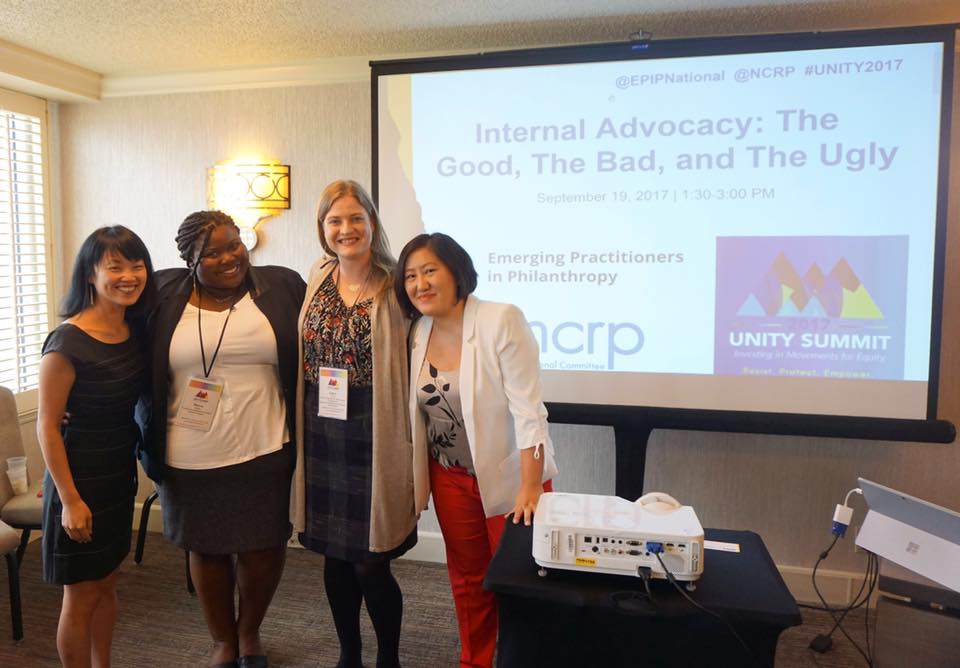By Chao Yang, Community and Employee Engagement Specialist at Medtronic Foundation/Minnesota Council on Foundations Ron McKinley Fellow
(Disclaimer: All viewpoints presented in this blog are my own and are not reflective of the foundations I work for.)
What is required of us as we try to survive daily microaggressions, avoid being colonized into dominant culture, fall prey to the filtering mechanisms that aim to keep out our differences so that we can all work together in perfect color-blind synchrony, while dealing with racial post-traumatic stress syndrome and attempting to move into larger professional roles to further the movement towards equity?
We had the opportunity to find out during the 2017 Unity Summit Conference.
For me, and conference participants who attended the National Committee for Responsive Philanthropy (NCRP) and Emerging Practitioners in Philanthropy (EPIP)’s breakout session, “Internal Advocacy: The Good, The Bad, and The Ugly”, the discussion was robust, raw, and honest regarding the many experiences of panelists and audience members and their experiences.
As a panelist, I shared one recent and difficult experience and how I advocated for myself. I was interviewed by a local private foundation for a Director role. The first question I was asked during the interview was, “You know we don’t offer a visa for this position, right?” without information as to why the question was being asked and without clarification as to whether the question was standard for all candidates. The question itself was loaded with underlying racial assumptions about my citizenship status. As an Asian American woman with a background in human resources, I came away from that experience determined to make a difference in the field of philanthropy by taking a keener interest in executive sourcing, and by having a conversation with the CEO of the foundation to express my concerns.
A few other important key perspectives and solutions to internal self-advocacy shared during the session included:
-
Find your tribe. Find colleagues or people inside your organization that will support you and help you rally against inequitable practices in the workplace.
-
Look outward. When your organization, leadership or team does not offer the growth opportunities you need, utilize philanthropic affinity groups to get the types of experiences or projects that will help propel you into your next role.
-
Go honey badger crazy. There will be pivotal points in time when you can’t walk away from an equity fight, because the right thing to do despite all odds is to stand up for what is not just politically correct but for what is morally right.
-
Evaluate the situation. Are you still able to make the kinds of relationships you need, the kind of impact you wish to see, and the growth in your professional career? If not, perhaps it’s time to walk away.
Yet, the underlying sentiment in the room as panelists and audience members shared personal stories and experiences became obvious. Although we were in a room of equity champions and the spectrum of philanthropy organizations varied from private to community, there were two prevalent themes:
-
Philanthropic organizations lack an inward facing equity lens for internal processes, internal organizational culture and environment.
-
Major issues continue to include systematic barriers and racist (conscious or unconscious) attitudes that reduce access and opportunities for philanthropic professionals of color and indigenous people from moving into more high-level roles.
As we move forward as a collective movement to build equity, it remains equally important to continuously examine our own internal structures, processes, and cultural norms that perpetuate inequities. This also includes an examination of our attitudes and beliefs as we encounter and work within our diverse networks. Last but not least, there is a need to build, support and sponsor new talent in our field who have the desire and drive to create a different and more equitable future.
Chao Yang is a member of the AAPIP Minnesota Chapter. She is the Community and Employee Engagement Specialist at Medtronic Foundation and a Minnesota Council on Foundations Ron McKinley Fellow. All viewpoints presented in this article are the author’s own and are not reflective of the foundations she works for.

